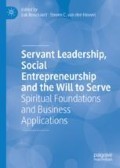Abstract
Scholarship regarding servant leadership has recently focused on the organizational context, as well as the personal development of the leader. This chapter continues with this emphasis relating servant leadership to the leadership moment, a theory that takes seriously the moment in time that the leadership experience takes place in as well as the different pieces—purpose, context, follower and leader. Each of these pieces is constitutive to the overall leadership experience and is deserving of further deliberation. As a further contribution to servant leadership, theological reflection of each of the different pieces of the leadership moment from the Christian tradition is also included. This reflection supports the leader in his/her evaluation of his/her work experience. This theological reflection supports the personal development of the leader, detailing the Christian horizon of significance as a plausible horizon that the leader can relate to.
Access this chapter
Tax calculation will be finalised at checkout
Purchases are for personal use only
Notes
- 1.
For example, see Miles. https://www.amazon.com/Why-Leadership-Sucks-Servant-Fundamentals-ebook/dp/B009QYLSCK.
- 2.
This worldview is based on the reformed Christian tradition. For more information about this worldview, see Albert M. Wolters, Creation Regained: Biblical Basis for a Reformational Worldview (Grand Rapids, MI: Eerdmans, 1985).
- 3.
This understanding of coheirs presupposes a specific understanding of creation. Such an understanding of creation does not assume a “closed system of creation” where everything has already been created, rather, creation is understood as “a continual event.” It continues to take place in the concrete conditions of time and space. For more information, see van Knippenberg, Towards Religious Identity, 124.
References
Bakke, DW 2005, Joy at work: a revolutionary approach to fun on the job, PVG, Seattle.
Boje, DM & Rosile, GA 2011, ‘Restorying the authentic and inauthentic self’, Seminar at Benedictine University, St. Louis, MO.
Boje, DM, Helmut, CA & Saylors, R 2013, ‘Cameo: spinning authentic leadership living stories of the self’, in Ladkin, D, Spiller, C (eds.), Authentic leadership clashes, convergences and coalescences, Edward Elgar, Cheltenham, pp. 271–278.
Burton, F, Chapman, M & Cross, A 1999, International business organization: subsidiary management, entry strategies & emerging markets, Palgrave Macmillan, London.
Collins, JC & Porras, J 1991, ‘Organizational vision and visionary organizations’, California Management Review vol. 34, pp. 30–52.
Deneulin, S 2013, ‘Christianity and international development’, in Clarke, M (ed.), Handbook of research on development and religion, Edward Elgar, Cheltenham.
Greenleaf, RK. 1977, Servant leadership: a journey into the nature of legitimate power and greatness. Paulist Press, New York.
Heidegger, M 1962 Being and time, trans. John Macquarrie and Edward Robinson, Harper and Row, New York.
Hofstede, G, Hofstede, GJ & Minkow, M 2010, Cultures and organizations: software of the mind, McGraw Hill, New York.
Irving, JA 2010, ‘Cross cultural perspectives on servant leadership’, in van Dierendonck, D, Patterson, K (eds.), Servant leadership: developments in theory and research, Palgrave Macmillan, Switzerland, pp. 118–130.
Irving, JA 2018, ‘Leader purposefulness and servant leadership’, in van Dierendonck, D, Patterson, K (eds.), Practising servant leadership: developments in implementation, Palgrave Macmillan, Switzerland, pp. 25–42.
Kärkkäinen, VM 2013, Christ and reconciliation, Eerdmans, Grand Rapids, MI.
Kesley, DH 2016, ‘On human flourishing: a theocentric perspective’, Yale Centre for Faith and Culture Resources. Accessed August 20, 2018, https://faith.yale.edu/sites/default/files/david_kelsey_gods_power_and_human_flourishing_0_0.pdf.
Kühl, S 2011, Organisationen: Eine sehr kurze Einführung, Verlag für Sozialwissenschaften, Dordrecht.
Ladkin, D 2010, Rethinking leadership: a new look at old leadership questions, Edward Elgar, Cheltenham, UK.
Mouw, RJ & Griffioen, S 1993, Pluralisms and horizons: an essay in Christian public philosophy, Eerdmans, Grand Rapids, MI.
Ng, KY, Koh, C & Goh, HC 2008, ‘The heart of the servant leader: leaders’ motivation-to-serve and its impact on LMX and subordinates’ Extra Behaviors’, in Graen, GB, Graen, JA (eds.), Knowledge Driven Corporation, Information Publishing, Charlotte, NC.
Patterson, K 2003, Servant leadership: a theoretical model, Doctoral Dissertation, Regent University.
Patterson, K 2006, ‘Servant-leadership: a brief look at love and organizational perspective’, International Journal of Servant Leadership vol. 2, pp. 287–296.
Ricoeur, P, 1984, Time and narrative, trans. K. McLaughlin and D. Pellauer, University of Chicago Press, Chicago.
Scott, WR & Davis, GF 2016, Organizations and organizing: rational, natural and open systems perspectives, Routledge, New York.
Sparrowe, R 2005, ‘Authentic leadership and the narrative self’, Leadership Quarterly vol. 16, no. 4, pp. 419–439.
Spears, LC 2004, ‘Afterword: the living legacy of Robert K. Greenleaf’, in Frick, D (ed.), Robert K. Greenleaf: a life of servant leadership, Be Koehler, San Francisco.
Strauch, A 2006, Leading with love, Lewis & Roth, Littleton, CO.
Taylor, C 2003, The ethics of authenticity, Harvard University Press, Cambridge, MA.
van Dierendonck, D 2018, ‘Building a people-oriented and servant-led organization’, in van Dierendonck, D, Patterson, K (eds.), Practising servant leadership: developments in implementation, Palgrave Macmillan, Switzerland, pp. 1–7.
van Dierendonck, D & Patterson, K 2015, ‘Compassionate love as a cornerstone of servant leadership: an integration of previous theorizing and research’, Journal of Business Ethics vol. 128, no. 11, pp. 119–131.
van Dierendonck, D & Patterson, K 2018, ‘Introduction’, in van Dierendonck, D, Patterson, K (eds.), Practising servant leadership: developments in implementation, Palgrave Macmillan, Switzerland, pp. 1–7.
van Knippenberg, T 2002, Towards religious identity: an exercise in spiritual guidance, Royal van Gorcum, Assen.
van ‘T Zet, J 2018, ‘Self-reflection and wonder as keys to personal growth and servant leadership’, in van Dierendonck, D, Patterson, K. (eds.), Practicing servant leadership. Palgrave Macmillan, Cham.
Volf, M 1991, Work in the spirit: toward a theology of work, Oxford University Press, New York.
Wolterstorff, N 2008, Justice: rights and wrongs, Princeton University Press, Princeton.
Wolterstorff, N 2011, Justice in love, Eerdmans, Grand Rapids, MI.
Author information
Authors and Affiliations
Editor information
Editors and Affiliations
Rights and permissions
Copyright information
© 2019 The Author(s)
About this chapter
Cite this chapter
Lin, P. (2019). Christianity and Servant Leadership. In: Bouckaert, L., van den Heuvel, S. (eds) Servant Leadership, Social Entrepreneurship and the Will to Serve. Palgrave Macmillan, Cham. https://doi.org/10.1007/978-3-030-29936-1_7
Download citation
DOI: https://doi.org/10.1007/978-3-030-29936-1_7
Published:
Publisher Name: Palgrave Macmillan, Cham
Print ISBN: 978-3-030-29935-4
Online ISBN: 978-3-030-29936-1
eBook Packages: Religion and PhilosophyPhilosophy and Religion (R0)

